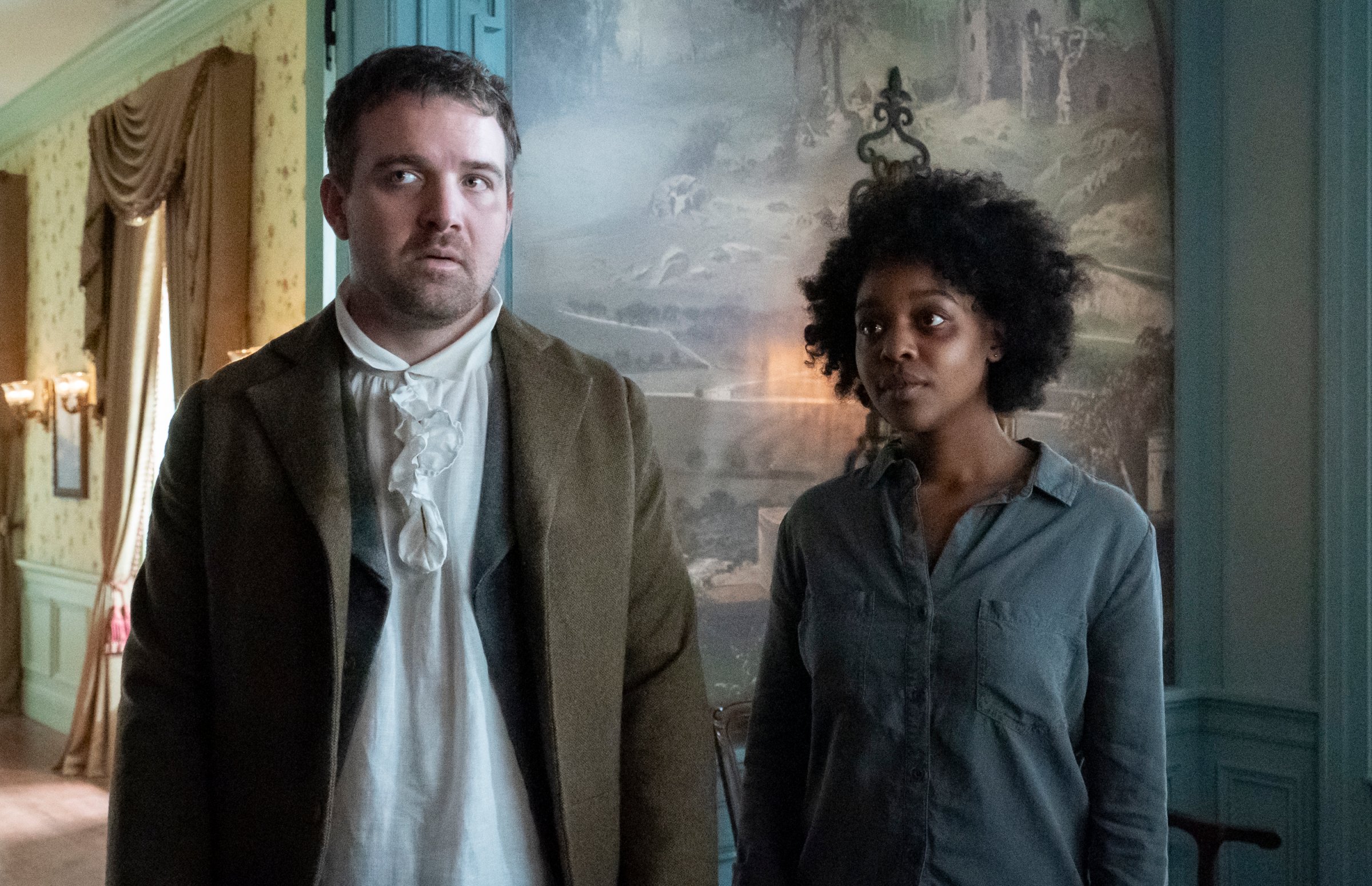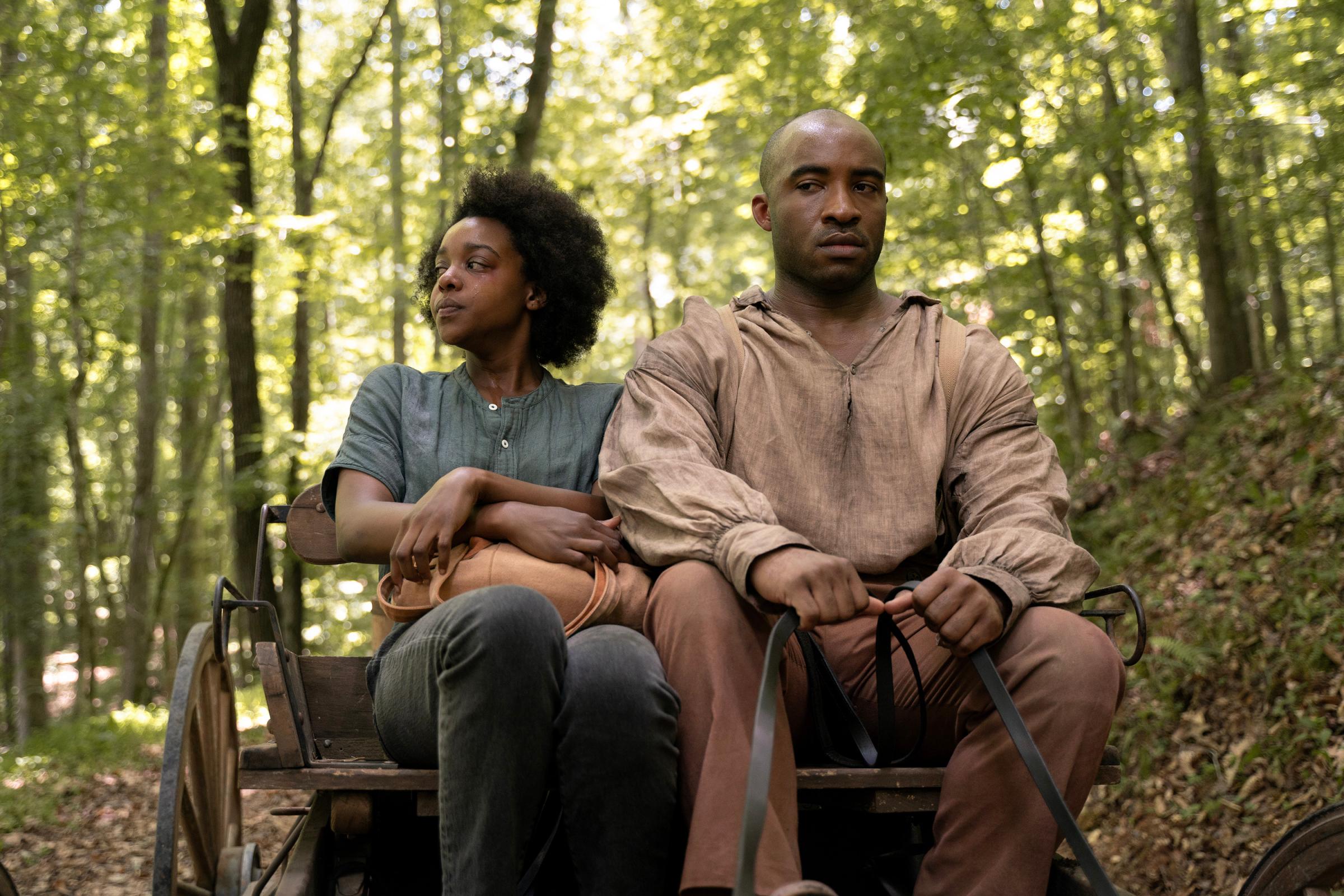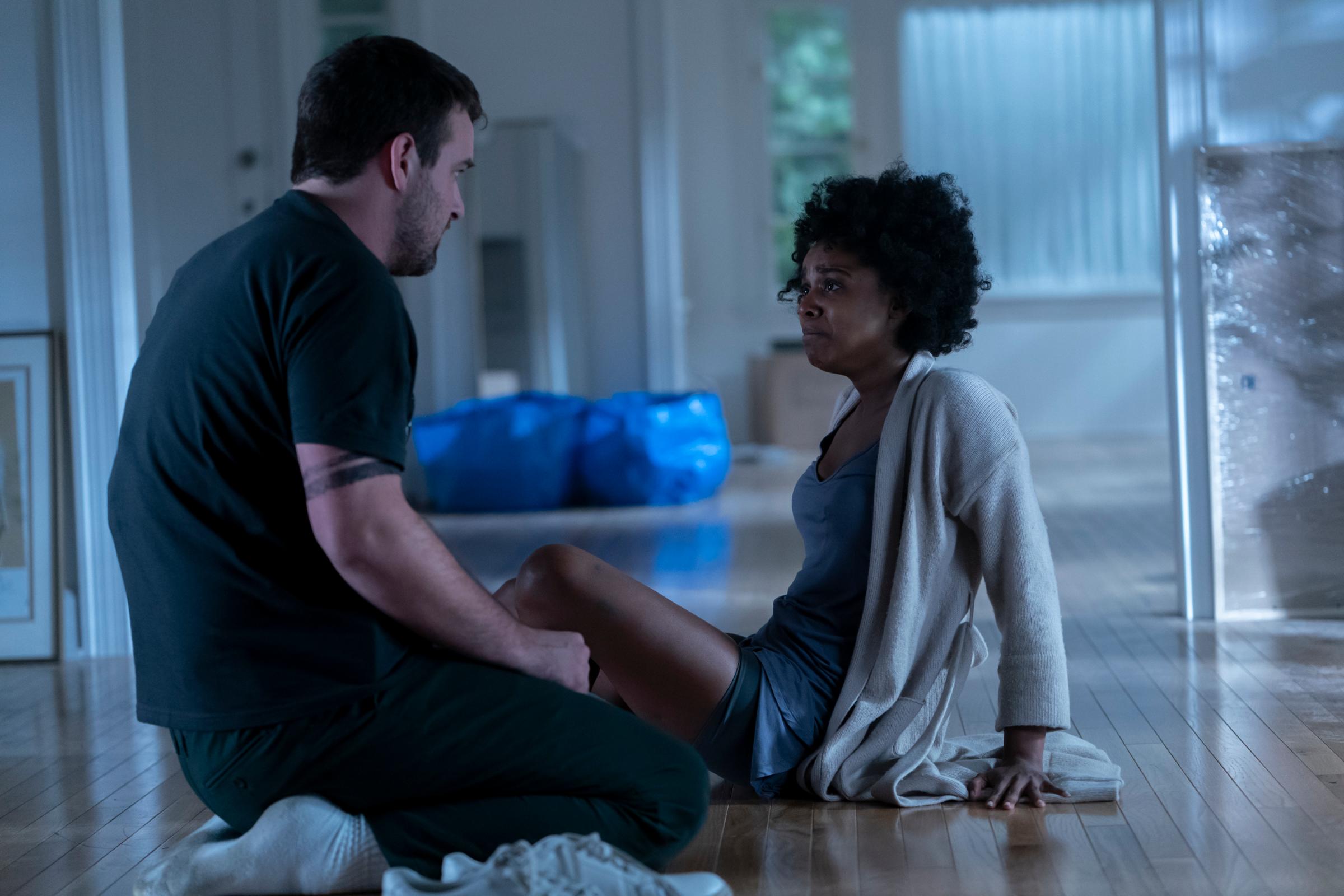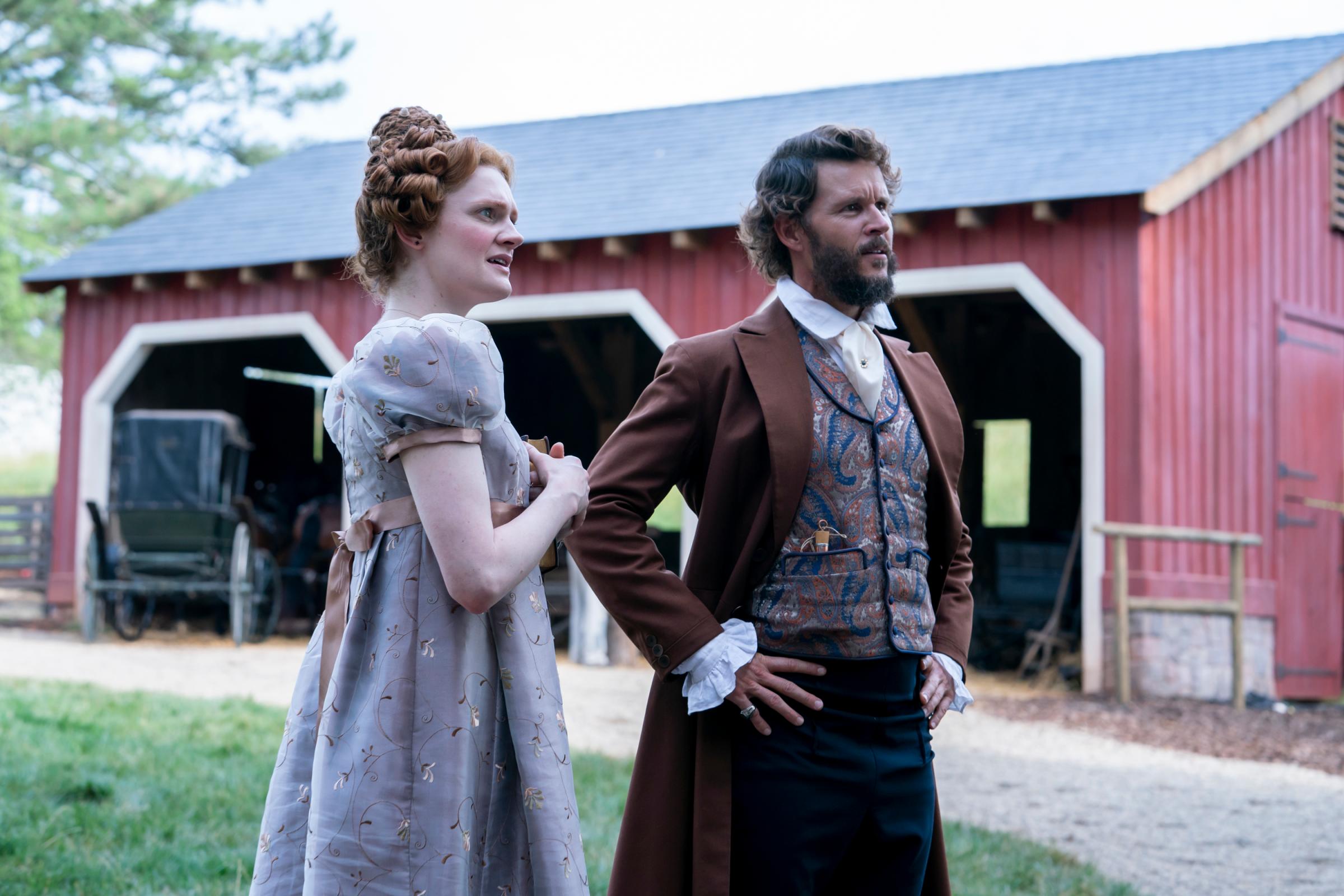
It is absolutely wild that it has taken nearly half a century for Octavia E. Butler’s 1979 novel Kindred to be adapted for the screen. Written in Butler’s propulsive, dialogue-heavy style and constructed out of elements—slavery narratives, time travel—that often fuel both prestige drama and genre franchises, the book cries out to be translated into a visual medium. And the same simple, poetic premise that has made it a classic of speculative literature all but guarantees the success of any competent adaptation: Dana, a young Black woman in mid-’70s California, is suddenly pulled back in time to a Maryland plantation in 1819 to save a little white boy from drowning. While her initial disappearance is over in minutes, she’s summoned back, for longer and longer periods, every time the impulsive child puts himself in mortal danger. Eventually, her new, white husband unwittingly accompanies her into the past, where their marriage is illegal.
In an eight-episode first season that will stream in its entirety on Hulu beginning Dec. 13, FX’s long-awaited Kindred doesn’t quite dazzle in the same way that the very best recent novel-to-TV adaptations have done. Shows like last year’s The Underground Railroad (which has Kindred encoded in its DNA) and Station Eleven expanded upon brilliant source material with brilliant audio, visual, and storytelling choices tailored to the small screen. But this series does, for the most part, do justice to the metaphor at the center of Butler’s masterpiece. That’s another way of saying that you shouldn’t miss it.

Writer and showrunner Branden Jacobs-Jenkins, a relative newcomer to TV whose previous work as a playwright has earned him a MacArthur “Genius Grant” and made him a Pulitzer finalist, is faithful to the spirit but not the letter of the novel. Working with a team of executive producers that includes The Americans duo Joe Weisberg and Joel Fields as well as filmmaker Darren Aronofsky, he’s wise to update the present-day story to 2022; while the book took place in the bicentennial year of 1976, what’s more salient in this adaptation is how contemporary Kindred still feels, two generations later. In this telling, 26-year-old Dana (recent Juilliard grad Mallori Johnson, with what should by all rights be a career-making performance) is a single aspiring TV writer who has just sold the family brownstone in Brooklyn following the death of her grandmother and bought a house of her own in Los Angeles.
Jacobs-Jenkins makes it hard, at first, to figure out what kind of story the show is telling. The outstanding premiere, directed by Janicza Bravo (Zola), moves deftly between genres and moods. It opens on a chilling, flash-forward vignette. We see Dana lying on the floor of her darkened home, wearing only underwear and a bloody tank top, crying out for someone named Kevin. She collects knives from the kitchen, runs a bath and salts the water, gets in the tub without undressing. The cops show up and demand to check on her. It sounds like they’re about to break down the door. Watching the nightmare escalate, you’ll likely wonder if this woman has lost her mind. She hasn’t—and the scenes that follow might lead some viewers to consider whether they’re especially quick to mistake trauma for derangement when the afflicted is Black and female.
Then we meet the smart, charming if unmoored Dana of two days earlier. At dinner with her kind aunt (Eisa Davis) and cranky uncle (Charles Parnell), who are now her only living relatives, she announces that she’s moved to their city permanently and is surprised to find they disapprove of her choice to uproot herself and chase a dream. The meal goes so poorly that she refuses a ride home and ends up in the car with their waiter, Kevin (Micah Stock giving Jake Johnson). So begins the rom-com portion of the program. Almost a decade Dana’s senior, Kevin (who shares a name with Dana’s husband in the novel) is a washed-up indie rocker whose warmth compensates for his music snobbery and tendency to monologue about himself. Gazing out at L.A. from a scenic overlook, they learn that they both lost their parents as kids. When she offers to reimburse him for gas because he’s spent all day driving her around, Kevin protests: “We’re in the orphan club together now. Orphans don’t pay orphans. They barter. With trauma.”

Neither realizes that they’re on the brink of an experience that will make the considerable hardships they’ve already suffered look trivial. This is what makes the initial genre confusion so effective; Dana doesn’t know what kind of story she’s at the center of, either, when she starts traveling back to the early 19th century to save young Rufus (David Alexander Kaplan) from himself. The choice feels true to Butler’s unique novel, too, which is sometimes classified as sci-fi but was considered by its author to be a “grim fantasy” and contains all the thematic depth of great literary fiction. For me, Kindred—with its real-world backdrop, fantastical premise, and potent political commentary—comes closest to the brutal beauty of the best Latin American magic realism, which is another reason why it might’ve benefited from more imaginative soundscapes, production design, and cinematography, particularly later in the season.
Still, in moving between the present and the antebellum past, where Dana and later Kevin can only survive by adhering to the norms of Rufus’ parents’ (True Blood alum Ryan Kwanten and GLOW’s Gayle Rankin) plantation, Jacobs-Jenkins unearths layers of meaning so elegantly embedded in Butler’s narrative. The big picture is of a nation that, almost 250 years into its existence as such, remains so scarred by the legacy of slavery that it’s always falling through metaphorical trap doors into a violent white-supremacist past. But it’s the details that give Kindred its nuance. Dana’s connection to Rufus invokes the complex history of who Black Americans’ ancestors really were. Among the enslaved characters, there are questions about complicity, rebellion, survival, internecine conflicts—and whether a well-intentioned Black woman from the 21st century can truly know how to help her 19th-century counterparts.

The show alters Dana and Kevin’s relationship in a way that keeps the focus on her, yet like the novel, it identifies a possibly unbridgeable gulf between a Black woman and a white man who otherwise have a lot in common. Can she love him after enduring the horrors that white men (and to an only slightly lesser extent, white women) inflicted on Black women firsthand? Can he live as a pampered guest in Rufus’ home, with Dana posing as his slave, without internalizing a toxic quantity of entitlement? Will these two ever truly be able to understand each other?
Despite the odd overly broad character (see: Dana’s new next-door neighbor, a prototypical Karen) or stiff line of period dialogue (“This rogue would protect his property before my daughter’s honor!”), the writing is solid. Jacobs-Jenkins’ most salient additions to Butler’s narrative are story lines about Dana’s family that seamlessly extend the time-travel allegory. There are plenty of promising places left for the show to go in the event that FX gives it a second season to follow up on the finale’s assorted cliffhangers.
But when Kindred really achieves excellence, it’s usually through Johnson’s extraordinary performance. As a woman adrift in young adulthood and unstuck in American history, she conveys the extremely specific double consciousness of a modern Black woman who must try to bend the antebellum world to her will. From the most harrowing punishments (which the show dramatizes sparingly and, to its great credit, never gratuitously) to Dana’s blissful early hours with Kevin, but most of all in quiet moments when the character is clearly thinking or feeling something she can’t safely articulate, Johnson conjures an entire topsy-turvy universe within a single consciousness. Belated as it is, no tribute to the work of Octavia E. Butler could be more apt.
More Must-Reads from TIME
- Cybersecurity Experts Are Sounding the Alarm on DOGE
- Meet the 2025 Women of the Year
- The Harsh Truth About Disability Inclusion
- Why Do More Young Adults Have Cancer?
- Colman Domingo Leads With Radical Love
- How to Get Better at Doing Things Alone
- Michelle Zauner Stares Down the Darkness
Contact us at letters@time.com